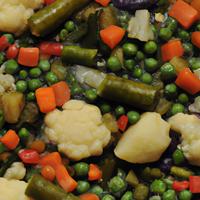
1 serving (100 grams) contains 65 calories, 3.0 grams of protein, 0.5 grams of fat, and 12.0 grams of carbohydrates.

Log this food in SnapCalorie

Nutrition Information
Calories |
154.8 | ||
|---|---|---|---|
% Daily Value* |
|||
| Total Fat | 1.2 g | 1% | |
| Saturated Fat | 0.2 g | 1% | |
| Polyunsaturated Fat | 0 g | ||
| Cholesterol | 0 mg | 0% | |
| Sodium | 95.2 mg | 4% | |
| Total Carbohydrates | 28.6 g | 10% | |
| Dietary Fiber | 9.5 g | 33% | |
| Sugars | 9.5 g | ||
| protein | 7.1 g | 14% | |
| Vitamin D | 0 mcg | 0% | |
| Calcium | 71.4 mg | 5% | |
| Iron | 2.4 mg | 13% | |
| Potassium | 476.2 mg | 10% | |
* Percent Daily Values are based on a 2,000 calorie diet. Your daily values may be higher or lower depending on your calorie needs.
Food Attributes
Source of Calories
About Mixed feozen vegetables
Mixed frozen vegetables are a convenient and versatile blend of pre-chopped veggies, typically including carrots, peas, corn, green beans, and sometimes broccoli or cauliflower. Originating as a staple for easy meal preparation, they pair well with dishes from a variety of cuisines, such as stir-fries, soups, casseroles, or pasta. These vegetables are flash-frozen shortly after harvesting, preserving their nutrients like vitamin A, vitamin C, fiber, and antioxidants. This makes them a nutritious option, especially for those looking to include more vegetables in their diet without sacrificing time. Since they are low in calories and free from added sugars, they support healthy eating. However, some pre-mixed varieties may contain added salt or seasonings, so it’s important to check labels for additional ingredients. Overall, mixed frozen vegetables offer a convenient and healthy way to incorporate various nutrients into your meals year-round.



